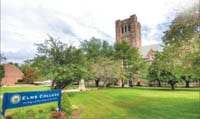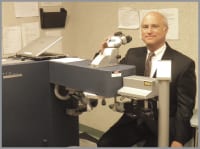Student Union Dual Master’s Degree Puts Elms at Forefront of Business and Health Care
Tania Spear has worked in the health sector for more than 17 years, and is currently the executive director of Good to be Home Care, a private-pay medical and non-medical home health care provider, based in Chicopee.
Originally, she matriculated through Elms College’s RN-to-BSN (bachelor’s of science in nursing) degree program. “I’ve been involved in community health for my entire professional career,” she told Healthcare News, “and about three or four years ago, I wanted to expand what I was able to do.
“I thought that working on the MSN [master’s of science degree in nursing] at Elms would open up some possibilities, or maybe even I could add teaching to what I do,” she continued. “But more than anything, I wanted to expand and advance my possibilities within health care.”
Spear is one of the inaugural members of Elms College’s new dual master’s degree, which joins nursing joined with a master’s in business administration. While she had originally entered the MSN program in 2009, the advent of this new degree track this fall meant a further development of her goals.
“In my own professional experience, health care is a business, just like any other setting,” she explained. “As I was taking the courses to complete my master’s degree in the nursing program, I really saw that I had my own knowledge deficit in finance and strategic planning, and when this opportunity came up, it made sense to complete that circle.
“Even though, as a nurse, I’m dedicated to improve upon quality outcomes,” she continued, “as a businessperson, I also know that we need to be focused on financial sustainability.”
Outlining the groundbreaking program underway at the Elms, Dr. Cynthia Dakin, assistant director of Nursing Graduate Studies, and Nancy Farrell, assistant director of Marketing and Communications, both described in detail a program that, as Spear mentioned, is an alluring hybrid of professional development within two spheres that, at almost every other school in the country, are mutually — though inexplicably — exclusive.
“This is really about students looking at themselves more broadly within a professional framework,” Dakin said. “The MBA is one of those degrees that universally is understood on some level, and the MBA on top of the MSN says that this is a broadly based nurse, someone who is ready to go out into business.”
The program is innovative on many levels, Farrell explained, not only in the content and directive of the dual degrees, but also in the actual method by which the MBA is taught.
“The whole delivery of the program is totally different than anything that has ever happened before at Elms,” she explained. “The MBA is delivered both digitally and face to face. It’s all done through an iPad, and texts are e-books, delivered through the tablet.”
Dakin and Farrell sat down recently with HCN to discuss this new dual-degree program, and how Elms College is providing a fresh look at the business of health care.
Joining Forces
The MSN program at Elms is itself relatively young. Dakin said that, when she came to the college in 2006, she and director of the department, Kathleen Scoble, had a goal of preparing advanced nurses for the marketplace.
“In 2008 we opened our MSN program,” Dakin said. “And we decided to open with two tracks. All students have a core group of classes, but then they break off into specialties. One is the nurse educator, and the other is what we call nursing and health services management.”
That first graduating class contained 16 students, Dakin said, and by and large, they were mostly in the education concentration.
“And our numbers had been small up until this spring for the nurse-management track,” she continued. “I believe we’ve graduated six, prior to this new MBA addition.”
But as the department looked further within the developing MSN curriculum, she continued, the health services management concentration trended very closely to a traditional business degree program.
“We looked at what it would take for those nurses to get an MBA, and it was really only six courses,” she explained. “Five from the MBA core, and an accelerated business foundations class, to give students the terminology that anyone taking business classes as an undergraduate would already know — something that nurses wouldn’t necessarily have known, but to give them a baseline.”
Because the graduate-level nursing degree was directly related to actual professional staffing needs that Scoble had determined through relationships with area health care organizations, the further development of the graduate business programs, so closely linked to the nursing curriculum, was a natural segue. With the final stages of the MSN MBA unveiled this past December, Dakin recalled an interaction she and Scoble had with a potential graduate candidate.
“It was at an open house with the MBA where we were trying to figure out how to pave the way,” she remembered. “There was one young man who came and told us, ‘this is interesting, because the MSN and the MBA are the only two programs I’ve been looking at. But in this area, there’s not one program that exists.’
“Maybe online, one could do the two simultaneously, but certainly far away,” Dakin continued. “And they were totally online programs. So this man was intrigued by the fact that he could come to campus and sit in a classroom, but also do some of it online as well. From there, it has just seemed to snowball.”
Busy as a B
The dual MSN and MBA program at Elms has been developed for students to take both courses of study at the same time, in a rigorous academic setting. The program totals 61 credits, and the college estimates that the coursework could be completed within 35 months of full-time study. Allowances are made to incorporate one’s professional needs, and thus the timeline could vary for each student.
“The foundation behind the graduate program is that you come out with that master’s in nursing degree and you’re considered an advanced, prepared nurse,” Farrell explained, “one of the highest credentials you can have in that profession.
“What the MBA provides for them on top of that is the ability to move into a leadership position within an administrative role,” she continued, “be it at a hospital, in nursing, or at an insurance facility. MBA credentials give them that validity, that not only are they capable and the highest-trained clinical professionals, but they also have a solid business background. It affords the nursing student a real-time look at the mechanics of running a business in health care. And not just at a hospital, really. The parameters get much larger.”
The educators of the business program are another unique component to the Elms, Farrell said. “The entire faculty base, for the most part, in the MBA track are executives within the Pioneer Valley — individuals who are CFOs, CEOs, heads of HR divisions. They’re working professionals, a whole new group of disciplines that the traditional nursing student never gets to meet within their masters program.”
Using the iPads for coursework introduces another key element to education that also has a foot out of the ivory tower and in the corporate world. As health care increasingly becomes dominated by cutting-edge technology, the tablet computers, in Farrell’s words, help the students “come up to speed.”
Business Opportunity
The MBA was not part of the original plan during the original development of the MSN, Dakin said, and she added that the creation of the nursing degree was a daunting challenge in and of itself. She said that there were fears of the dual degree’s popularity, but one of the greatest recruiting forces the college has are the graduated nurses themselves.
Farrell agrees. “Graduate programs are unique, and it is a non-traditional type of recruiting process,” she explained. “A lot of it is via word of mouth. Graduate students want to know what another grad student’s experiences are like, and so our graduates become our ambassadors.”
And while the dual-degree program develops over time, the two said that the initial goals of providing advanced nurses with the best tools for the marketplace continue, sometimes even before they leave the campus.
“As both the MSN and MBA are so new,” Dakin said, “we have even been hiring some of our own graduates.” Indeed, one student, whose capstone project was in the “integration of simulation in an undergraduate program,” has been hired to implement her project in the curriculum.
While the Elms was “late to the table” in creating a master’s in nursing, Dakin said, the dual degree puts the school at the forefront of most nursing programs in the nation. Continuing on that theme, Farrell said that, as the college gets ready to begin construction on a state-of-the-art science facility, an extension to the building housing the department in Berchmans Hall, Elms is positioned to be an increasingly competitive force in higher education.
But the most important forces are still those students who seek the Elms for the opportunities that will come from the dual degree. While Spear joked that her course load is about to get a lot busier in the weeks ahead, “it was almost like it didn’t make sense not to complete this additional degree.”
She recalled that, “in one instance, we were taking a finance course in the MSN, and these are things I use daily in my business. I report to a board of directors, I review and present a budget every year — every day I look at numbers, and those aren’t things you learn in nursing school.
“Yes, I was getting a taste of that in the MSN,” she went on, “and most nursing managers are using the numbers that they get in order to make decisions. But when you’re in a higher-level position, you need to have a better understanding beyond that. Most health care leaders have people on their team who are looking at their finances, looking at their accounting. But it’s important for me to take that and move forward my own self in efficiency.”
Community health care is where Spear sees herself staying upon completion of the MSN MBA. “Where I am is a great place,” she said, “and this knowledge will help me to build it better.”


